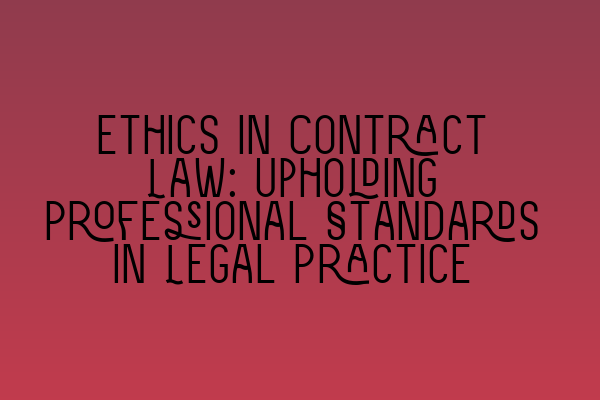Ethics in Contract Law: Upholding Professional Standards in Legal Practice
As a solicitor, it is imperative to always act in accordance with the highest professional standards. In the realm of contract law, ethical conduct plays a vital role in maintaining the integrity of legal practice. In this blog post, we will explore the importance of ethics in contract law and discuss how solicitors can uphold professional standards in their daily legal practice.
Before delving into the specifics, it is crucial to understand the meaning of ethics in the context of contract law. Ethics refers to the moral principles and values that guide the behavior and decisions of individuals within a profession. In the legal field, ethical conduct ensures that solicitors act responsibly, honestly, and fairly while representing their clients and dealing with contractual matters.
One key ethical principle in contract law is the duty of loyalty. Solicitors have a duty to act in the best interests of their clients and prioritize their clients’ objectives above any personal interests. This duty of loyalty requires solicitors to avoid conflicts of interest and maintain confidentiality, as well as to provide honest and unbiased advice.
Integrity is another fundamental aspect of ethical conduct in contract law. Solicitors must strive to maintain the highest levels of integrity in their interactions with clients, adverse parties, and the court. This means being truthful in representations made, avoiding misleading statements or omissions of relevant information, and conducting themselves with honesty and transparency at all times.
Furthermore, competence and diligence are essential ethical standards in the legal profession. Solicitors must possess the necessary knowledge and expertise to handle contract law matters competently. It is crucial for solicitors to stay updated with the latest developments in contract law and continue their professional development through courses and training programs, such as SQE 1 Preparation Courses and SQE 2 Preparation Courses. By enhancing their skills and knowledge, solicitors can ensure that they provide excellent service to their clients.
When drafting and reviewing contracts, solicitors must exercise diligence and attention to detail. This includes conducting thorough research, identifying potential risks, and ensuring that all contractual terms are clear, complete, and unambiguous. Diligence also extends to maintaining proper records, meeting deadlines, and promptly communicating with clients and other parties involved in the contract.
Ethics in contract law also entail avoiding abusive or unfair contractual terms. Solicitors should ensure that contracts are fair, balanced, and in compliance with applicable laws and regulations. This includes protecting vulnerable parties from exploitative clauses and striving for equitable outcomes in contractual relationships.
By upholding ethical standards in contract law, solicitors contribute to the credibility and reputation of the legal profession as a whole. Ethical behavior builds trust with clients and strengthens the system of justice. It also promotes the fair and harmonious resolution of contractual disputes, which is essential for a well-functioning society.
In conclusion, ethics in contract law play a critical role in maintaining professional standards in legal practice. Solicitors should adhere to the principles of loyalty, integrity, competence, and diligence to ensure ethical conduct in their daily practice. By continually updating their knowledge and skills, utilizing resources such as SQE 1 Practice Exam Questions, SQE 1 Practice Mocks FLK1 FLK2, and adhering to SQE 1 and SQE 2 Exam Dates, solicitors can enhance their expertise and provide excellent service to their clients. By promoting ethical conduct in contract law, solicitors contribute to the overall integrity and credibility of the legal profession.
